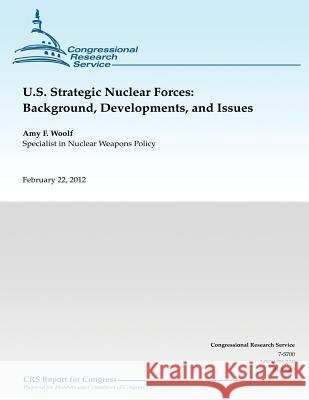U.S. Strategic Nuclear Forces: Background, Developments, and Issues » książka
U.S. Strategic Nuclear Forces: Background, Developments, and Issues
ISBN-13: 9781482075748 / Angielski / Miękka / 2013 / 40 str.
During discussions about the 2010 Nuclear Posture Review, Congress reviewed and discussed the plans for maintaining and modernizing U.S. strategic nuclear forces. Although the United States plans to reduce the number of warheads deployed on its long-range missiles and bombers, consistent with the terms of the New START Treaty, it also plans to develop new delivery systems for deployment over the next 20-30 years. As a result, the 112th Congress will continue to review these programs during the annual authorization and appropriations process. During the Cold War, the U.S. nuclear arsenal contained many types of delivery vehicles for nuclear weapons. The longer-range systems, which included long-range missiles based on U.S. territory, long-range missiles based on submarines, and heavy bombers that could threaten Soviet targets from their bases in the United States, are known as strategic nuclear delivery vehicles. At the end of the Cold War, in 1991, the United States deployed more than 10,000 warheads on these delivery vehicles. That number has declined to less than 6,000 warheads today, and is slated to decline to 1,550 warheads by the year 2017 if the New START Treaty enters into force. At the present time, the U.S. land-based ballistic missile force (ICBMs) consists of 450 Minuteman III ICBMs, each deployed with between one and three warheads; they will all be reduced to only one warhead over the next few years. The Air Force has deactivated all 50 of the 10-warhead Peacekeeper ICBMs and 50 Minuteman III missiles. The Air Force is also modernizing the Minuteman missiles, replacing and upgrading their rocket motors, guidance systems, and other components. The Air Force had expected to begin replacing the Minuteman missiles around 2018, but has decided, instead, to continue to modernize and maintain the existing missiles, so that they can remain in the force through 2030. The U.S. ballistic missile submarine fleet currently consists of 14 Trident submarines; each carries 24 Trident II (D-5) missiles. The Navy converted 4 of the original 18 Trident submarines to carry non-nuclear cruise missiles. The remaining submarines currently carry around 1,200 warheads in total; that number will decline as the United States implements the New START Treaty. The Navy has shifted the basing of the submarines, so that nine are deployed in the Pacific Ocean and five are in the Atlantic, to better cover targets in and around Asia. It also has undertaken efforts to extend the life of the missiles and warheads so that they and the submarines can remain in the fleet past 2020, and to begin design work on a new submarine. The U.S. fleet of heavy bombers includes 19 B-2 bombers and 94 B-52 bombers. The B-1 bomber is no longer equipped for nuclear missions. The fleet will decline to around 60 aircraft in coming years, as the United States implements New START. The Air Force has also begun to retire the nuclear-armed cruise missiles carried by B-52 bombers, leaving only about half the B-52 fleet equipped to carry nuclear weapons. The Air Force plans to procure both a new long-range bomber and a new cruise missile over the next 20 years. The Obama Administration is completing a review of the size and structure of the U.S. nuclear force, and a review of U.S. nuclear employment policy, as it implements the 2010 Nuclear Posture Review. It is also implementing the New START Treaty with Russia that will limit the number of deployed missiles and warheads in the U.S. strategic force. Congress will review the Administration's plans for U.S. strategic nuclear forces during the annual authorization and appropriations process, and as it assesses U.S. plans under New START and possible future arms control treaties with Russia.
Zawartość książki może nie spełniać oczekiwań – reklamacje nie obejmują treści, która mogła nie być redakcyjnie ani merytorycznie opracowana.











